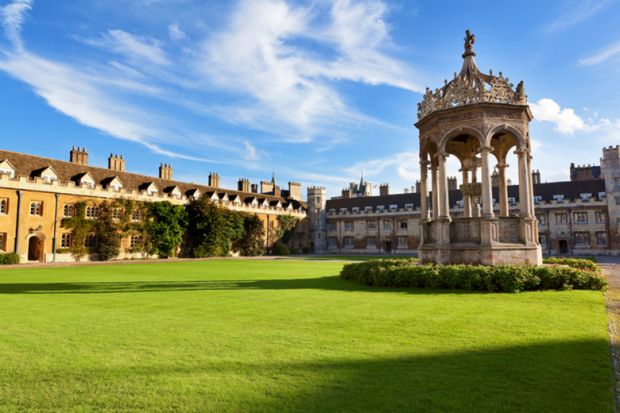Union members could boycott Trinity College, Cambridge, after it confirmed its decision to withdraw from the Universities Superannuation Scheme.
The University and College Union officially censured Trinity – the organisation’s most serious sanction, used only once before – after college fellows voted down a motion to reconsider its departure from the pension fund by 76 to 43.
The union will set up a committee to decide what action the boycott should entail, if Trinity refuses to back down. It may include asking academics from around the world not to apply for jobs, give lectures, or conduct external examining for Trinity.
Scholars may also be asked not to attend conferences or take up visiting professorships at Trinity, or not to write for any journal edited by Trinity staff.
Trinity, which has assets worth £1.3 billion, said last month that it was leaving the higher education sector’s biggest pension fund because of the “remote but existential risk to the college from continued participation in USS”.
The USS is a “last employer standing scheme”, with sponsoring employers jointly liable for members’ pensions. As a result, in a worst-case scenario, all of Trinity’s assets could be lost to USS.
Trinity is spending £30 million withdrawing from USS and setting up its own pension scheme for staff.
The decision to censure Trinity was taken at an emergency meeting of UCU’s higher education committee. The union has only used its power of censure once before, against London Metropolitan University in 2009.
Paul Bridge, UCU’s head of higher education, said that the “cost to Trinity’s reputation from a boycott will be far greater than the tiny risk of being left to carry the can for pensions if the higher education sector collapses”.
“A boycott is our most serious sanction, but Trinity needs to be clear that we are prepared to implement one there,” Mr Bridge said. “The sector needs to work together to deliver high-quality, guaranteed pensions and it is up to Trinity to now reconsider its short-sighted decision.”
A leaked letter from USS to Universities UK regarding Trinity’s departure warned that “should one more strong employer withdraw from the scheme then the covenant would be downgraded from ‘strong’ to ‘tending to strong’”.
Speaking previously, Rory Landman, Trinity’s senior bursar, said that this was “not a decision taken lightly by the college council”.
“Following substantial legal and actuarial advice, and bearing in mind our responsibilities as charity trustees of Trinity, we believe leaving USS is in the best interests of the college,” he said.

